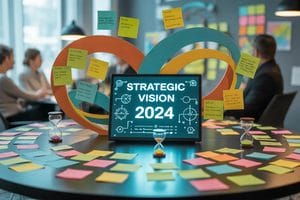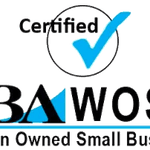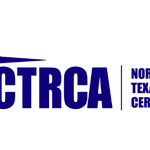TL;DR; This comprehensive guide explores how ADHD coaching specifically helps executives and professionals transform their ADHD traits into leadership advantages. Learn evidence-based strategies for improving executive function, discover how coaching differs from therapy, and understand the concrete benefits for your career advancement.
Introduction
As someone who lives with ADHD and coaches executives navigating similar challenges, I intimately understand both the struggles and the hidden gifts that come with an ADHD brain in leadership roles. Recently, I worked with a CEO who had built a successful tech company despite (or perhaps because of) his ADHD. “I’ve achieved success,” he told me, “but I feel like I’m constantly one missed detail away from disaster.” I smiled, remembering my own journey from software developer to leadership coach, and how that same feeling had once driven me to develop the systems and strategies I now share with my clients.
What struck me most was how this leader, like many others I’ve coached, had developed impressive compensatory strategies but was exhausting himself maintaining them. Through our coaching partnership, we discovered that his ADHD traits – when properly channeled – actually enhanced his ability to innovate and lead with vision. The key was learning to work with his brain’s wiring rather than against it.
If you’re curious about what ADHD coaching sessions actually look like, we’ve created a transparent guide to the process that demystifies how coaching specifically addresses executive challenges.
The Hidden Advantage of ADHD in Leadership
Recent research reveals that approximately 15.5 million U.S. adults have ADHD, with a surprising statistic: studies suggest that up to 21% of managers self-report having ADHD traits. This isn’t coincidental. The same characteristics that can challenge us – rapid thinking, creative problem-solving, and intense focus when engaged – often become catalysts for innovation and strategic leadership when properly channeled.
What many don’t realize is that some of history’s most innovative leaders likely had ADHD. From Richard Branson to Walt Disney, these visionaries succeeded not despite their different thinking patterns, but because of them. They found ways to leverage their unique cognitive styles while building systems to support areas where they needed structure. For a deeper exploration of how ADHD traits can become leadership advantages, see our guide on Leading with ADHD – Executive Coaching Strategies for Leadership Excellence.
When properly channeled during high-stakes situations, these traits can make ADHD leaders exceptionally effective at crisis management and rapid decision-making. Research from Harvard Business Review shows that neurodivergent individuals often excel in pattern recognition and innovative problem-solving – critical skills for modern leadership.
I’ve seen this pattern repeatedly in my work with executives at Tandem Coaching. One technology leader described it perfectly: “My mind constantly jumps between ideas – which used to feel chaotic until I realized that’s exactly how I connect dots others miss.” This ability to see unexpected connections often translates into strategic insights that drive innovation and competitive advantage.
Understanding Your ADHD Leadership Profile
Before diving deeper into strategies, I invite you to reflect on how ADHD manifests in your leadership style. Unlike generic leadership assessments, understanding your specific ADHD-influenced patterns provides the foundation for authentic leadership development.
The ADHD Executive Leadership Assessment
Take a moment to consider these questions. Rather than viewing them as limitations, think about how each trait influences your leadership approach:
How does your ability to hyperfocus manifest in your leadership? For some executives I’ve coached, this translates to exceptional project completion when engaged, while others find themselves diving too deeply into details that could be delegated.
When does your mind generate its most innovative ideas? Many of my clients discover specific conditions that spark their creativity – whether during movement, conversation, or even in the midst of seemingly unrelated activities.
What systems have you already developed to manage your executive function challenges? Often, leaders with ADHD have created ingenious workarounds without recognizing their value.
How does your emotional sensitivity influence your leadership relationships? Many ADHD leaders possess extraordinary empathy that strengthens team connections when properly channeled. For those interested in developing this aspect further, our article on Emotional Intelligence on Overdrive – ADHD Coaching for Better Emotional Regulation in Leadership provides valuable insights.
Understanding your profile also means recognizing how your variable focus and energy patterns affect your leadership style throughout the day. This self-awareness becomes the foundation for developing adaptive strategies that work with your natural rhythms rather than against them.
What I’ve found most valuable about this reflection process is how it shifts the conversation from “fixing problems” to “optimizing strengths.” One senior executive I worked with realized that her tendency to generate rapid-fire ideas wasn’t something to suppress but rather to structure. We developed a “thought partnership” model where she paired with a detail-oriented colleague to transform her innovative concepts into executable plans.
The Science Behind ADHD Leadership Success
The research on ADHD coaching is compelling. A comprehensive review published in the Journal of Attention Disorders found that 18 out of 19 studies demonstrated significant improvements in ADHD symptoms and executive functioning following coaching interventions. What’s particularly relevant for leaders is how these improvements translate to workplace performance.
I’ve witnessed this transformation repeatedly in my coaching practice. When we apply evidence-based strategies specifically designed for the ADHD brain, leaders experience remarkable growth in their ability to:
Execute strategic initiatives with greater consistency. One CFO I worked with increased his project completion rate by 40% within three months by implementing what we called “momentum mapping” – a visual approach to project management that maintained his engagement.
Communicate more effectively with teams. A marketing director discovered that her tendency to jump between topics – previously seen as disorganized – became an asset in creative brainstorming sessions when properly structured and communicated.
Make more confident decisions. By developing decision-making frameworks that worked with his natural thinking style, an operations executive reduced decision fatigue while improving outcome quality.
This improvement is measurable through specific progress tracking methods designed for ADHD brains, ensuring accountability and celebrating growth in ways that resonate with how neurodivergent minds process achievement.
What makes these transformations possible isn’t forcing ADHD executives to work against their natural tendencies. Instead, it’s about creating systems and approaches that align with their cognitive styles while addressing specific executive function challenges.
Transforming ADHD Traits into Leadership Strengths
The moment I realized my ADHD wasn’t a leadership liability but potentially my greatest asset changed everything. It happened during a particularly challenging project when my ability to see unexpected connections helped solve a problem that had stumped my team for weeks. This experience shapes how I coach executives today.
One of my clients, a marketing director, recently shared a similar revelation. “For years,” she told me, “I thought my rapid-fire thinking was something to suppress in executive meetings. Now I understand it’s what helps me see market trends before our competitors do.”
This transformation from viewing ADHD traits as challenges to leveraging them as leadership advantages doesn’t happen by accident. It requires a deliberate approach that honors how our brains actually work.
The Power of Strategic Thinking
When we harness the ADHD mind’s natural tendency toward big-picture thinking, something remarkable happens. Take Michael, a CFO I worked with last year. He struggled with maintaining attention during detailed financial reviews, yet his ability to spot patterns made him exceptional at strategic planning.
Together, we developed an approach that played to his strengths. Instead of fighting his tendency to think broadly, we created specific times for what he called “vision work.” During these sessions, he would allow his mind to explore connections freely, while his team handled the detailed analysis. The result? His department began identifying market opportunities months before their competitors.
“I stopped trying to be like every other CFO,” he shared, “and started leading in a way that felt natural to me.”
Building Authentic Leadership Presence
Perhaps the most powerful transformation happens when ADHD leaders stop masking and start leading authentically. This doesn’t mean letting ADHD traits run unchecked – rather, it means developing a leadership style that works with, not against, your natural tendencies.
I remember working with Sarah, a tech company VP who initially came to me feeling like an impostor in her executive role. “I don’t fit the traditional leadership mold,” she confided during our first session. “I’m too energetic, too direct, too easily excited about new ideas.”
Over six months, we worked together to transform these perceived limitations into strengths. Instead of trying to contain her energy, she learned to channel it effectively. Her enthusiasm became contagious, inspiring innovation across her team. Her direct communication style, when properly focused, cut through corporate complexity and got things done.
The turning point came during a high-stakes product launch. When unexpected problems arose, Sarah’s ability to think quickly and generate creative solutions under pressure saved the project. “That was when I realized my ADHD traits weren’t just something to manage – they were my competitive advantage,” she told me.
This authenticity becomes particularly powerful when building and leading neurodivergent teams where diverse thinking styles are valued and different perspectives drive innovation.
Discover Your ADHD Leadership Profile
Every ADHD executive leads differently. Take our free 5-minute assessment to uncover whether you’re an Innovative Visionary, Crisis Champion, Empathetic Connector, or Strategic Pattern-Spotter – and learn how to leverage your unique strengths.
The Tandem Coaching ADHD Leadership Approach
At Tandem Coaching’s ADHD Executive Coaching practice, our approach differs significantly from both traditional executive coaching and general ADHD coaching. We integrate deep understanding of leadership development with specialized knowledge of how ADHD manifests in professional contexts.
Our methodology centers on three core principles:
First, we start with strengths rather than challenges. By identifying how your ADHD traits create unique capabilities, we build confidence and leverage natural advantages. One technology executive discovered that his tendency to question established processes – previously seen as disruptive – was actually driving essential innovation when properly channeled.
Second, we develop personalized systems that work with your brain rather than against it. Generic productivity advice often fails ADHD leaders because it doesn’t account for how our minds process information and manage attention. For professionals seeking specific productivity strategies, our guide on Productivity Unleashed – ADHD Coaching Tips to Boost Productivity offers practical techniques tailored to the ADHD brain.
Third, we focus on sustainable success rather than quick fixes. Many ADHD executives have experienced the frustration of solutions that work briefly before falling apart. Our coaching partnership builds lasting change through iterative development and ongoing support.
James, a senior director at a financial services firm, described the difference this way: “Previous coaches gave me techniques that worked for a few weeks before I abandoned them. Through Tandem’s approach, I’ve developed systems that have sustained me through two promotions and a major company reorganization.”
Building Your ADHD Leadership Toolkit
Through years of coaching executives with ADHD, I’ve found that certain strategies consistently drive success. Let me share some approaches that have transformed my clients’ leadership journeys:
Which of Your Systems Need Repair?
Before building new strategies, identify what’s actually broken. Our 8-minute Systems Audit diagnoses which of your six core executive systems need attention first.
Building Your ADHD Leadership Toolkit
Through years of coaching executives with ADHD, I’ve found that certain strategies consistently drive success. Let me share some approaches that have transformed my clients’ leadership journeys:
Strategic Energy Management
Traditional time management advice often fails ADHD leaders because it doesn’t account for how our energy and attention naturally fluctuate. Instead, I work with clients to develop what I call “energy-aligned scheduling.”
This approach begins with mapping your natural energy patterns throughout the day and week. When do you naturally focus best? When does your creativity peak? When do you struggle most with detailed work?
One CEO I coached discovered that his strategic thinking was sharpest in the morning, while his ability to handle people-focused meetings peaked in the afternoon. By restructuring his schedule to align with these patterns, he not only improved his performance but also reduced his stress significantly.
This includes designing meeting formats that work with your ADHD brain rather than against it, transforming what many ADHD executives consider their biggest challenge into productive collaboration opportunities.
“I stopped fighting my brain,” he told me, “and started working with it instead.”
Enhanced Decision-Making
ADHD often brings both challenges and gifts to the decision-making process. The challenge might be maintaining focus during detailed analysis, while the gift could be intuitive pattern recognition or innovative thinking.
Through our coaching partnership, executives develop personalized decision frameworks that leverage their strengths while addressing potential blind spots. For some, this means creating visual decision maps; for others, it involves structured thinking partners who complement their style.
Visual decision-making tools are particularly effective, which is why ADHD-friendly strategic planning frameworks emphasize visual mapping over linear approaches, allowing ADHD executives to see connections and possibilities that traditional planning methods might miss.
A marketing executive I worked with developed what she called her “decision matrix” – a visual tool that helped her evaluate options without getting lost in details or making impulsive choices. “It gives my creative thinking some guardrails,” she explained, “without shutting down the intuitive insights that make me valuable to the company.”
Authentic Communication
Many ADHD leaders struggle with either over-communicating or under-communicating. Their thoughts move quickly, making it challenging to organize and express ideas in ways others can easily follow.
Through targeted coaching, executives develop communication approaches that honor their thinking style while ensuring clarity and impact. This might include creating “communication templates” for different situations that provide just enough structure without feeling constraining.
One technology leader I coached had brilliant ideas but struggled to communicate them effectively in board meetings. Through our work together, he developed what he called his “translation process” – a way to convert his non-linear thinking into structured presentations without losing the innovative spark that made his contributions valuable.
Building strong communication also extends to creating effective mentorship and peer support networks where you can practice authentic leadership without masking, finding others who understand and value your unique communication style.
Systems and Tools Integration
Success with ADHD requires more than willpower – it requires systems that work with your brain’s natural patterns. This includes optimizing your physical and digital environment to support rather than sabotage your ADHD brain.
Technology can be a powerful ally when chosen wisely. Our curated guide to ADHD-friendly tools and apps helps you avoid app overwhelm while finding solutions that actually work for executive-level challenges.
For those struggling with organizational challenges specifically, our guide on Organize Your Success – ADHD Coaching to Master Organizational Skills provides targeted strategies that go beyond generic advice to address ADHD-specific organizational needs.
Choosing Your Support Format
As you consider ADHD coaching, it’s important to understand the different formats available to find what works best for your unique needs and circumstances.
Some executives thrive in individual coaching relationships where they can dive deep into personal challenges with complete privacy and customized attention. Others find that group dynamics provide valuable peer learning and reduce the isolation many ADHD leaders experience.
Similarly, remote coaching can be as effective as in-person sessions, depending on your needs and preferences. Many ADHD executives find that virtual coaching reduces sensory overwhelm while providing the flexibility their variable schedules demand.
The key is finding the format that aligns with your learning style, comfort level, and practical constraints rather than forcing yourself into a one-size-fits-all approach.
The Path Forward: Your ADHD Leadership Journey
If you’re reading this and recognizing your own leadership experience, you might be wondering what comes next. Based on my work with hundreds of executives through our Leadership Development Program, here’s what I’ve found makes the difference between struggling and thriving with ADHD in leadership roles:
First, embrace the understanding that your brain works differently – not better or worse, just differently. This shift in perspective opens possibilities that trying to conform to neurotypical expectations never will.
Second, recognize that sustainable success comes from working with your natural tendencies rather than against them. The most successful ADHD leaders don’t succeed by overcoming their ADHD; they succeed by leveraging it strategically.
Third, consider whether professional support might accelerate your growth. Just as elite athletes work with coaches to optimize their performance, ADHD executives benefit from specialized coaching that addresses their unique challenges and opportunities.
Finally, remember that leadership success isn’t just about professional achievement – it’s about creating a sustainable approach that supports your wellbeing. Many executives with ADHD struggle with work-life boundaries, often leading to burnout. Our article on The Work-Life Harmony Blueprint – ADHD Coaching for Work-Life Integration explores how to create meaningful integration between your professional and personal life.
Is ADHD Coaching Right for You? A Self-Assessment
I’ve developed this brief assessment to help you determine if ADHD coaching might benefit your leadership journey. Consider each statement and note how strongly it resonates with your experience:
- Despite your success, you feel you’re working harder than necessary to stay organized and focused.
- You have brilliant ideas but struggle to implement them consistently.
- Traditional productivity systems haven’t worked for you long-term.
- You find yourself either hyperfocused on projects or completely disengaged.
- Your mind works differently than most of your colleagues, which is both an advantage and a challenge.
- You’ve developed compensatory strategies that work but require enormous energy to maintain.
- You sometimes feel like you’re “faking it” in your leadership role.
- You wonder how much more you could achieve if you could harness your ADHD traits more effectively.
If four or more of these statements strongly resonate with you, ADHD-informed executive coaching could be transformative for your leadership journey.
Frequently Asked Questions
How is ADHD coaching different from therapy?
ADHD coaching focuses on developing practical strategies and forward-looking goals rather than addressing past issues or clinical symptoms. While therapy might explore the emotional impact of ADHD, coaching concentrates on performance enhancement and leadership development. Many of my clients work with both a therapist and a coach, as the approaches complement each other. At Tandem Coaching, we focus specifically on professional performance and leadership effectiveness.
I'm already successful – how can ADHD coaching help me?
Many of my most accomplished clients initially asked this same question. What they discovered was that while they had achieved success, they were often doing so at an unsustainable personal cost. ADHD coaching helped them maintain or even increase their performance while significantly reducing stress and effort. One executive described it as “finally finding the right gear after years of driving with the emergency brake on.”
How long does it take to see results from ADHD coaching?
While individual experiences vary, most clients begin noticing improvements within the first month of coaching. These initial changes might include better energy management, more effective meeting participation, or improved delegation. More substantial transformation typically unfolds over 3-6 months as new systems become habitual and leadership approaches evolve. Research supports this timeline, with studies showing significant improvements in executive functioning within 3-6 months of consistent coaching.
Will people notice I'm getting coaching?
What colleagues typically notice isn’t that you’re receiving coaching but rather the positive changes in your leadership effectiveness. Many of my clients find that team members comment on their improved clarity, more consistent follow-through, or enhanced strategic thinking. Rather than hiding their coaching experience, some executives choose to share it openly, modeling the importance of continuous growth and development.
Your Next Step: Exploring ADHD Coaching
If you’re considering whether ADHD coaching might enhance your leadership journey, I invite you to schedule a complimentary discovery session with our team at Tandem Coaching. During this conversation, we’ll:
- Explore your specific leadership challenges and opportunities
- Discuss how ADHD coaching might benefit your particular situation
- Answer any questions you have about the coaching process
- Determine if we’re the right fit for working together
This no-obligation conversation gives you the opportunity to experience our coaching approach firsthand and make an informed decision about next steps.
Remember, seeking support isn’t a sign of weakness – it’s a strategic decision to optimize your performance and wellbeing. As one of my clients recently said, “I wish I’d done this years ago. I didn’t realize how much energy I was spending just trying to work against my natural patterns.”
Ready to explore how ADHD coaching could transform your leadership journey? Schedule your complimentary discovery session today.
Want a Thought Partner?
You’ve read the strategies. You understand the concepts. But sometimes what you need isn’t another framework – it’s a conversation with someone who’s coached ADHD executives through exactly what you’re facing.
Cherie offers complimentary 30-minute consultations for ADHD leaders ready to stop managing around their brain and start leveraging it. No pitch. No obligation. Just a focused conversation about your situation.
About the Authors
Cherie Silas, MCC
She has over 20 years of experience as a corporate leader and uses that background to partner with business executives and their leadership teams to identify and solve their most challenging people, process, and business problems in measurable ways.















